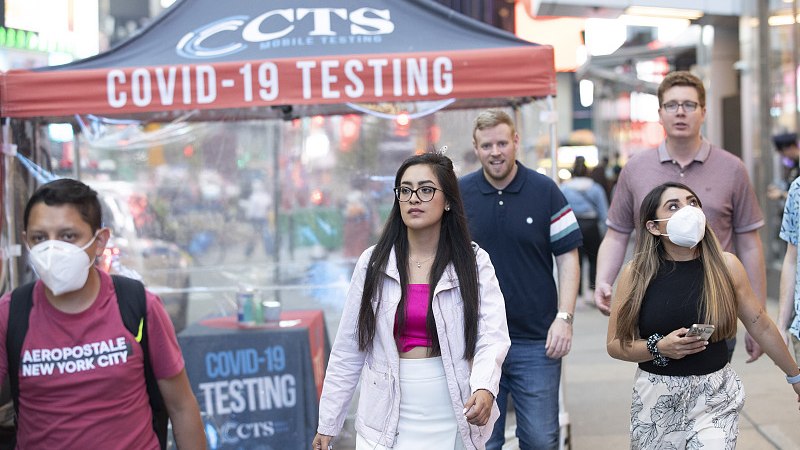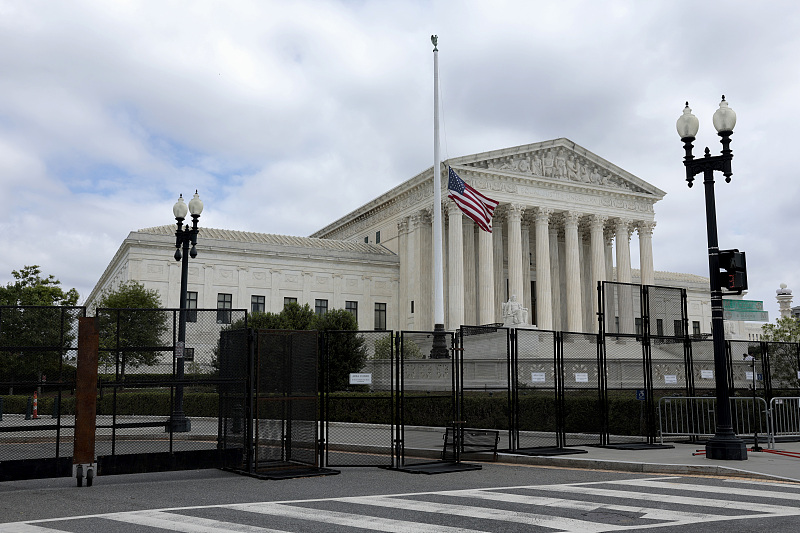
People are seen at a COVID-19 detection station in Times Square in New York, U.S., May 12, 2022. /CFP
People are seen at a COVID-19 detection station in Times Square in New York, U.S., May 12, 2022. /CFP
Editor's note: William Jones is the Washington Bureau Chief of Executive Intelligence Review and a Non-Resident Fellow of the Chongyang Institute for Financial Studies. The article reflects the author's opinions, and not necessarily those of CGTN.
It came as something of a surprise to most people when WHO Director-General Tedros Ghebrehyusus on May 10 said that China should change its policies of restrictions in the light of the more communicable Omicron variety of COVID-19.
"We don't think that it (dynamic zero-COVID policy) is sustainable, considering the behavior of the virus and what we anticipate in the future," he said. "We indicated that the approach will not be sustainable."
"A shift would be very important."
The director-general had previously been very supportive of China's dynamic zero-COVID policy, pointing to it as a model that other countries could learn from. But then he was attacked by some in the West as being too "China-friendly." Perhaps this pressure has had some effect on him. But his advice seems very misplaced at this point at a time when the new Omicron variant of the virus is proving to be more communicable than the previous variants.
Does the director-general now want less rigorous measures with a variant that moves more quickly through the population? Has he accepted a policy of surrender in the face of the new variant, fearful that we will have no means of essentially coping with it? Hopefully not, as we have seen that those countries which have adopted something of a laissez-faire policy, letting the virus spread, have had the highest death tolls.
Look at the United States with its one million deaths due to COVID-19, even with its somewhat erratic attempt to develop an effective policy. We also have the unfortunate example of the latest attempt to "get things back to normal" without considering the dangers at the recent White House Correspondents' Dinner. While assuring that all the participants (several thousand of them) had their vaccine cards up to date, the dinner was maskless and without social distancing.
One comedian, entertaining the crowd joked about how this was a "superspreader event," at which all the audience tittered in laughter. Shortly after the dinner, the COVID-19 affected numbers went up in the District of Columbia and the neighboring Northern Virginia. Among those infected were the Secretary of State Antony Blinken, who attended the dinner.
The statistics don't lie. Those countries which instituted a strict COVID policy, even at the point of having parts of their economy temporarily shut down, saved more people than those countries which maintained a lax policy or no policy at all. And the loss of the people is a permanent loss.
It is not like losing money or even losing a business. You can make up the money with time or set up another business later. But the people you have lost are gone – and will not return. This is a permanent, as opposed to a temporary, loss, to the nation, and a most serious one.

The U.S. flag flies at half-staff near the United States Supreme Court building in Washington, D.C., U.S., May 12, 2022. /CFP
The U.S. flag flies at half-staff near the United States Supreme Court building in Washington, D.C., U.S., May 12, 2022. /CFP
China has a real policy of putting people first. So it is natural that they will move, under threat of a pandemic, to policies that will save people – even at a temporary cost to the economy. Other countries are not so keen when it comes to that. For certain countries, it is more a question of keeping Wall Street happy rather than saving lives on Main Street.
In addition, the Chinese government is taking measures to maintain production and to keep the wheels of the economy moving as much as possible in the face of the necessary restrictions. Both fiscal and monetary policies are geared to provide the support the economy and the people need to weather this storm. Everything from food supply, to medical assistance, to hospital care has been mobilized to make the emergency work.
While wagging tongues abroad may upbraid China for again trying to implement dynamic zero-COVID policy, they will rue the day when the next wave of COVID-19 hits them (and it no doubt will) and they see their death toll again rise as they adapt the same "laissez faire" attitudes that led to such a calamity in the last phase of this global crisis.
In order to clear up any confusion about the nature of the policy, Chinese Foreign Ministry spokesperson Zhao Lijian responded to the Tedros comments at the daily briefing on May 11: "China's dynamic zero-COVID policy is not aimed at realizing zero infection, but rather at bringing COVID-19 under control at the minimum social cost in the shortest time possible so as to effectively protect the health, normal life and production of the 1.4 billion Chinese people to the maximum," Zhao said. "The COVID-19 infection rate and mortality rate in China remain the lowest in the world."
(If you want to contribute and have specific expertise, please contact us at opinions@cgtn.com. Follow @thouse_opinions on Twitter to discover the latest commentaries in the CGTN Opinion Section.)

